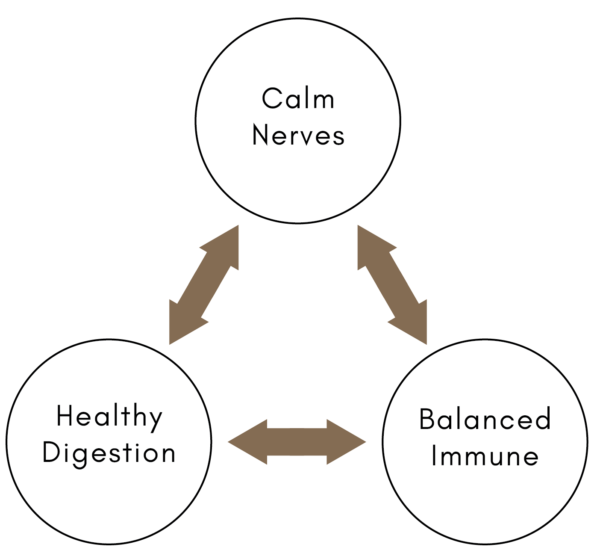How to Overcome Complex Chronic Inflammatory Conditions
Stage 3: The Neuro-Endocrine System

Fig. 3: "The Trifecta."
Once the immune and digestive systems are working together, the next step is to reboot the neuro-endocrine system.
By metabolizing and eliminating old stress hormones, we begin to take the body back to its preferred state of parasympathetic function.
This fresh start allows us to ingrain the positive changes from the previous stages so that we can move forward in life from a position of relaxed strength.
Stress is a gift.
We are resilient creatures designed to grow and get stronger as we interface with the world.
When the world challenges us, we adapt and evolve. This is part of our journey as humans in this life.
"Stress" is an overused word that has a bad reputation it doesn't deserve.
A life devoid of stress would be unbearably boring. Imagine a movie or a book with no conflict to drive the story.
What most people actually should be minimizing isn’t stress, it's trauma.
One can become the other, and it's vitally important that we understand the difference.
A little bit of stress gives us a seed for growth and development.
Stress becomes trauma when it is either too intense (high amplitude) during a short period of time (a traumatic event), low amplitude but too frequent without allowing for recovery in between stressors (burnout), or too intense and too frequent (severe compounding traumatic events).
When stress becomes trauma, our neuroendocrine system tries to adapt to the burden, and in the process many symptoms emerge including headaches/migraines, poor sleep, muscle tension, IBS-like issues including bloating and constipation/diarrhea, high blood pressure, high blood sugar, anxiety, palpitations (feeling your heart thump in chest), irritability, malaise, and eventually depression and exhaustion.


Conventional medicine really doesn’t have much to offer in this realm. Antidepressants can be helpful for some patients, but many find themselves growing increasingly dependent on them over time.
Sedatives and anti-anxiety medications are non-targeted, meaning they sedate the entire brain, not just select areas. So side effects like poor focus, poor cognition, and difficult memory often make patients feel like they’re losing vital parts of themselves.
Our brains have ingenious ways of processing new information, one of which is during deep sleep. When we are able to generate REM stage sleep (REM = Rapid Eye Movement, dreaming states) our brains rearrange information in various ways to try and find new connections between ideas, as well as helping to contextualize and make sense of our experiences.
It’s like a literal brainstorm.
However, in the case of past traumas, often times the memories are so powerfully charged, that the brain can’t handle working with them. So we will automatically have trouble sleeping. It’s as if the mind knows that when we sleep, all bets are off and it may have to re-experience the traumas. We see this in extreme cases in recurring dreams and PTSD cases. Every night the mind re-lives the experience in an effort to contextualize and make sense of what happened.
So a common symptom of neuro-endocrine overwhelm is difficulty sleeping. Which leads to a vicious cycle of fatigue, weakened immunity, and more stress.
It’s important to understand that there are many reasons for insomnia, and in this case it is being self inflicted by a brain that isn’t ready to process traumatic events.
Conventional, and alternative medicine often use sleep aids in one form or another to try to force the system to sleep. And while they do technically work, meaning your duration of sleep increases, the actual depth and quality of sleep does not, since the mind is still blocking itself.
So you will wake up after 8 hours of “sleep” still feeling exhausted, wondering why you can’t seem to get your energy back.
Additionally many sleep aids create dependence. Including some of the natural ones like melatonin. These can be useful in the short term, but the danger is becoming habituated to the point where you lose the ability to fall asleep without them. That is the opposite of medical independence.
For people caught in this cycle it can be terribly frustrating to feel like you have no control over your sleep cycle. Hopefully this new information helps you understand the deeper mechanics at play.
Adrenal Fatigue
Carrying long term stressors and traumas eventually takes a toll on your energy reserves. Fatigue is incredibly common. Caffeine is commonly used to offset the fatigue. Again, great in the short term, but long term use depletes future energy stores.
Alternative medicine has begun to embrace a paradigm known as Adrenal Fatigue. There are different stages of severity, but the general situation consists of a system that has burned out its resources and can barely generate enough hormones to keep itself going.
The usual strategy that most practitioners use is to directly supplement the adrenals, which can give short term relief. As is typical, we can evaluate the long term efficacy of an intervention based on the level of independence it brings.
Without addressing the underlying deep systematic causes of the “Adrenal Fatigue,” the best we can hope for is a lifetime of supplementation.
Often what we find is that pathogens such as bacteria, fungi, mold, and viruses have taken advantage of an already weakened immune system and are hiding throughout the body. One of the survival strategies of these pathogens is to mimic body tissue to confuse the immune system.
This can cause the immune system to create collateral damage in the body as it tries to hunt down the invaders.
Adrenal glands can be caught in the crossfire (especially in conditions such as Addison’s Disease), and the damage they take contributes greatly to the fatigue.
When we move through the stages of treatment in the proper order, Stage 1 refines and balances the immune system while helping to eliminate the majority of pathogens. Stage 2 builds up a healthy gut microbiome to out-compete future pathogenic invaders.
Often times once these underlying conditions are in effect, adrenal supplementation isn’t even necessary, as the body is coming back online and able to self-regulate as it should. Medical independence here we come!


Stress, Tension and Pain
Another effect of chronic stress and trauma in the body has to do with physical tension.
When we receive stressful stimulus, we are evolutionarily wired to do one of three things.
And they all start with F.
Fight, Flee, or Freeze.
Depending on your constitution, you may have a preference for one of these over the others, but make no mistake the majority of this behavior is instantaneous and registers too fast for the conscious mind to control it.
To really understand this, you have to be willing to think like a caveman.
Fight:
People with a tendency to fight will immediately tense and activate their shoulders and necks in preparation for battle. The shoulder tension prepares the arms for punching and clawing. The neck tension ripples up into the jaw so that we can bite. In modern people, this type of stress response tends to cause tight shoulders, TMJ, and migraines.
Flee:
People with a tendency to flee will immediately tense and activate their lower back and hips in preparation to run away. This gets the legs ready. In modern people this type of stress response leads to low back pain, sciatica, and possibly reproductive issues due to lack of blood flow.
Freeze:
People with a tendency to freeze will immediately tense everything, and in an effort to seem small and go unnoticed, the breathing will become very shallow and quiet.
In modern people this full body tension will decrease blood flow leading to a cold feeling, and the shallow breathing will negatively affect immune, digestive, and neurological function.
Of course therapies like massage and acupuncture can be helpful to decrease the stress burden on the body.
However, unless the other systems (Immune and Digestive), and the underlying causes have been attended to, you’ll get temporary if any relief from these palliative therapies.
The autonomic neuro-endocrine system subconsciously controls the majority of bodily function, including organs of digestion, detoxification, respiration, circulation, immunity…
Stage 3 helps us to tune our autonomic neuro-endocrine system to support the work from the previous stages as we move into the future. Taking this journey step-by-step in the proper order is the key difference between short term relief and long term transformation.
How do we do this?
In Stage 3 we continue and enhance the work of the previous stage by using herbs and practices that have been shown to:
- Regulate Sleep and Circadian Rhythm
- Release Muscle Tension
- Increase Fascial Flexibility
- Metabolize Stored Stress Hormones
- Promote Healthy Nerve Function
- Balance and Regulate Cortisol Release
- Regulate Liver Enzymes
- Support Healthy Digestion
- Promote Parasympathetic (“Think, Rest and Digest”) Nervous Function
- Reduce Oxidative Stress
- Decrease Menopausal Hot Flashes
- Regulate Gut Bacteria
- Regulate Melatonin for a balanced Circadian rhythm
During Stage 3 you will continue your self care training and learn new techniques to further regulate gasotransmitters such as Nitric Oxide (NO) for a more effective stress response, balanced gut microbiome, and efficient immune system .
You will learn methods* to enhance your living and working environment to be more conducive to neuro-endocrine healing.
*Picture neurological feng shui and emotional judo...


During Stage 3 we know changes are taking hold in your Neuro-Endocrine System by observing the following signs:
- Electric and Tension Pains Down
- Energy Level at Healthy Levels
- Balanced Stress Response and Mood
- Mental Clarity and Focus Return
- Libido Regulated
- Emotional Releases
- Sleep Cycle Regulated
- Waking Feeling Rested and Ready for the Day
- A Deepening Sense of Inner Peace
Personal Growth
In an effort to protect us, our subconscious mind will store traumas in the body and not let us process them. Especially when our system is already weakened due to chronic illness and inflammation, this strategy is meant to keep us from being overwhelmed.
What we often find is that after having done the work in Stages 1 and 2, the subconscious realizes that your entire system has become strong enough to handle the processing, so it starts the release. Vivid dreams, as well as spontaneous crying have been commonly reported during Stage 3 as you lighten your relationship to the past.
Within our program we include support and strategies for gracefully navigating this part of your process.
Deep emotional release may be uncomfortable at times, but we would encourage you to lean into it. Don’t judge yourself, accept what comes and move through.
None of us can run from our past forever, and the fact that your subconscious knows you’re strong enough to handle it is a huge show of confidence.
This aspect of healing yourself is fundamental for long term transformation. When you can begin to truly let go of the attachments to your past you will naturally evolve into a different calibre of person.
Life gets much easier, and graceful, once you’re on the other side of this process.
Thanks to the work from the earlier stages, you will have the strength and stability to get through.

